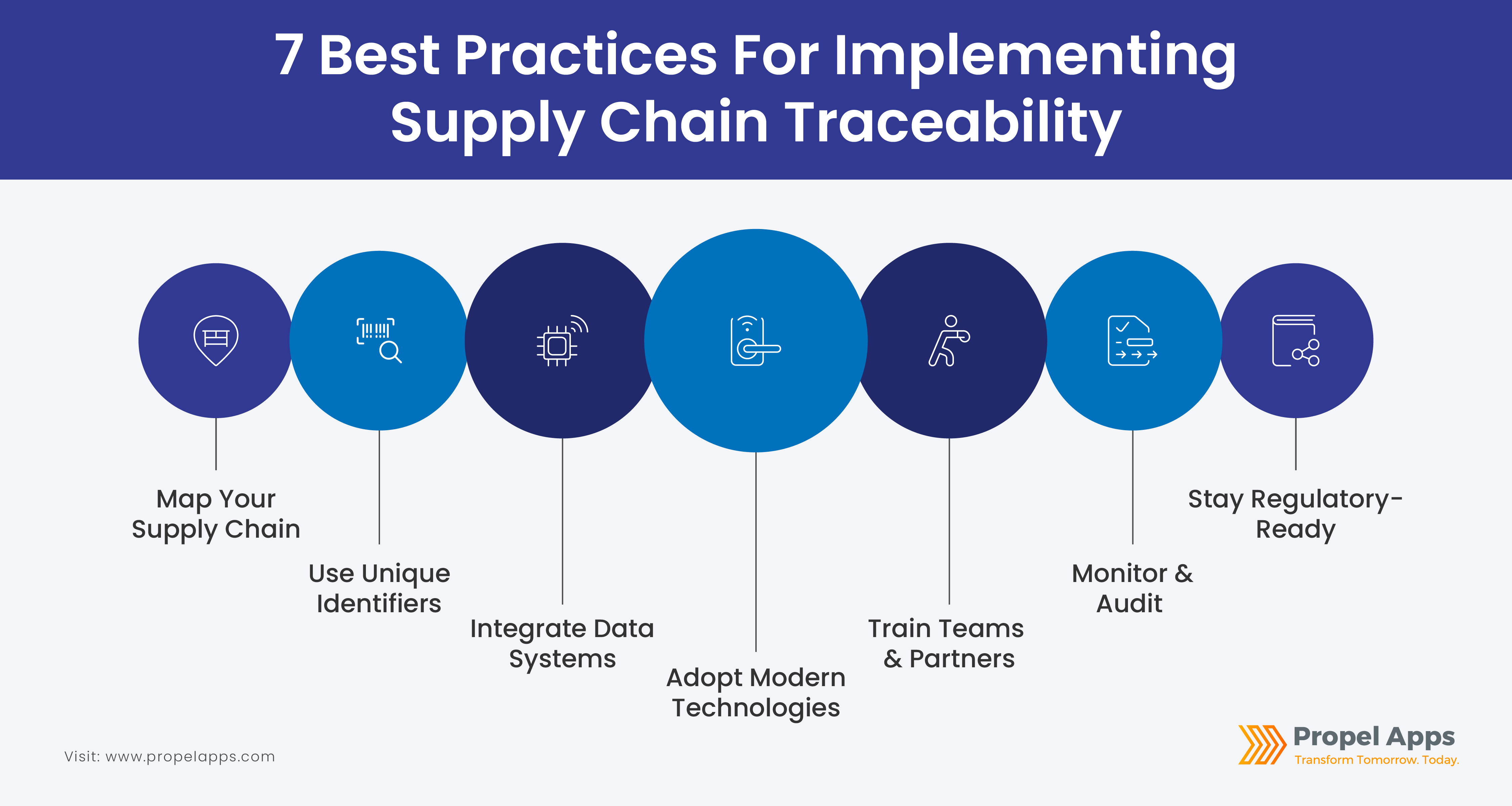
In today’s global and connected economy, supply chain traceability has become essential for ensuring transparency, accountability, and efficiency across all supply chain operations. As customers demand more product information and regulations tighten, the ability to trace a product’s journey, from raw materials to the final customer, is now a core element of successful supply chain integration.

Whether you manage a small business or a large enterprise, strong traceability practices help improve efficiency, minimize risks, and build lasting Supply Chain Trust. This guide explores what supply chain traceability is, why it matters, the challenges involved, and how emerging technologies—like blockchain, IoT, and a mobile SCM solution, are shaping the future of supply chains.
Supply chain traceability means tracking the journey of a product and its components across the entire supply chain—from raw materials to manufacturing, logistics, and delivery. It builds a complete record of every step, ensuring visibility across all Supply Chain Operations.
For example, automotive giants like BMW and Ford use advanced traceability systems to monitor parts sourcing and supplier performance. These systems ensure safety, quality, and fast root-cause identification in case of recalls.
Modern consumers want to know the origins and ethics behind the products they buy. Transparency strengthens Supply Chain Trust and brand loyalty.
Many global regulations now mandate supply chain traceability.
Meeting such standards helps businesses stay compliant and avoid penalties.
Traceability helps isolate defects quickly and minimize recall impacts. For instance, when Toyota faced large-scale airbag recalls, its traceability systems helped pinpoint faulty batches and limit disruption.
Continuous monitoring across every stage of the supply chain ensures adherence to quality standards. Early detection of deviations minimizes waste and prevents defects from reaching customers.

Global networks create variations in regulations and standards, complicating traceability. The textile sector, for example, struggles to trace cotton through multiple intermediaries.
Collecting and maintaining accurate data from numerous partners is challenging. Industries like pharmaceuticals must handle sensitive data while ensuring global compliance.
Comprehensive traceability systems can be costly. Deloitte reports that blockchain-based systems may range from $2 million to $5 million, including infrastructure and training costs.
Partners may hesitate to adopt new tools due to cost or complexity concerns. Success depends on clear communication and demonstrated ROI.
Blockchain ensures data integrity through an immutable, transparent ledger. Each transaction forms a permanent record accessible to all stakeholders.
De Beers, for instance, uses blockchain to verify the ethical sourcing of diamonds, enhancing consumer confidence and Supply Chain Trust.
IoT devices like sensors and RFID tags capture real-time data about product conditions and locations.
DHL uses IoT to monitor temperature and humidity for pharmaceutical shipments, reducing spoilage and ensuring compliance.
AI and ML automate data analysis, detect patterns, and predict risks. IBM’s Watson AI, for example, analyzes global data to predict potential supply chain disruptions—helping organizations maintain smoother Supply Chain Operations.
Cloud platforms allow real-time collaboration and data access.
Unilever uses cloud solutions to manage inventory, monitor sustainability, and enhance visibility across its global supply chain.

Following these practices creates a transparent, efficient, and trusted supply chain integration framework.
A mobile SCM solution provides real-time visibility and control across your entire supply chain. It enables managers to monitor inventory, shipments, and orders on the go-eliminating delays and manual tracking errors.
Access live updates on product movement, order status, and warehouse activity anytime, anywhere. Real-time data ensures accurate decision-making and supports complete supply chain traceability.
Instant access to information helps you act quickly on disruptions. If a shipment is delayed, you can reroute it or notify partners immediately.
Mobile platforms foster seamless communication between suppliers, distributors, and teams, improving Supply Chain Operations and responsiveness.
Mobile tools simplify regulatory compliance by automating data capture and report generation. In the food industry, companies like Nestlé rely on mobile SCM systems to maintain FSMA-compliant traceability.
Propel Apps offers a comprehensive mobile supply chain solution that streamlines complex supply chain processes for Oracle EBS, Oracle SCM Cloud, and SAP S/4HANA. It captures barcode inventory data with precision, ensuring seamless tracking across your supply chain.
Schedule a free demo to explore how Propel Apps’ mobile SCM solution can transform your traceability and integration goals.
Supply chain traceability is now a business necessity, not a luxury. It builds consumer trust, ensures compliance, improves efficiency, and minimizes risk. While challenges like cost and data management exist, the long-term gains far outweigh them.
By adopting technologies such as blockchain, IoT, AI, and cloud systems—and integrating a mobile SCM solution, businesses can achieve full visibility, transparency, and resilience in their supply chain operations.
Nearly 96% of supply chain leaders reported digital tools improved visibility into end-to-end costs, showing real business impact from digital traceability/visibility investments (AI, cloud, analytics).
Embrace traceability to strengthen your supply chain trust, foster innovation, and prepare for the Future of Supply Chain.
